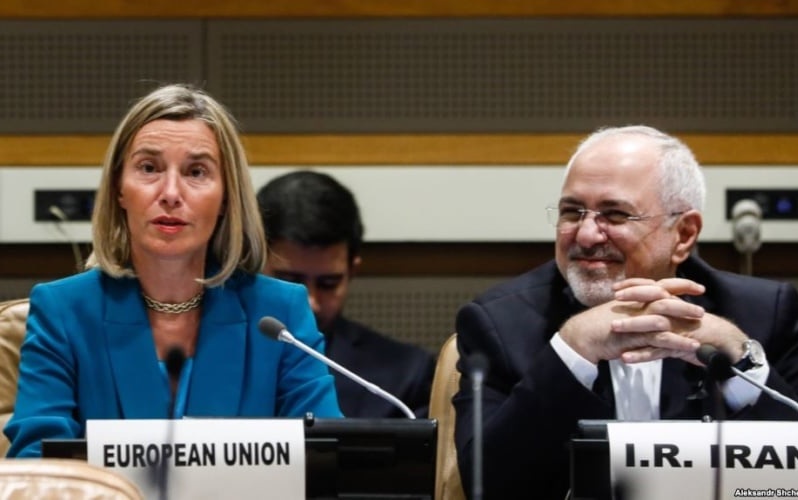Iran Foreign Minister Mohammad Javad Zarif with the European Union’s Federica Mogherini on sidelines of UN General Assembly, September 2018 (Aleksandr Shcherbak/TASS)
The European Union and three European signatories of the 2015 nuclear deal say they are “extremely concerned” by Iran’s suspension of commitments.
The EU’s foreign policy head Federica Mogherini and the Foreign Ministers of France, Germany and the UK issued the statement after Iran restarted uranium enrichment activities at its Fordow facility.
The Europeans said, “We urge Iran to reverse all measures inconsistent with the JCPOA [Joint Comprehensive of Action.”
They warned that they could trigger a dispute settlement mechanism, giving 30 days for signatories to resolve an issue. If there is no agreement, the UN Security Council could authorize the “snapback” of its sanctions, lifted in January 2016 with implementation of the deal.
The International Atomic Energy Agency confirmed on Monday that Iran has reopened Fordow, its latest step in a series of suspensions over US sanctions and the failure to establish an economic link with the Europeans to bypass the restrictions.
Under the nuclear agreement, Fordow was to be shut for 15 years.
Since late June, Iran has exceeded the JCPOA’s limit on stocks of 3.67% enriched uranium, raised enrichment to 4.5%, and installed advanced IR-4 and IR-6 centrifuges.
Last Tuesday, in the “fourth step” of suspension, President Hassan Rouhani confirmed injection of gas into 1,044 centrifuges, including the IR-4 and IR-6 models.
Iran has stopped short of resuming its pre-2015 production of 20% uranium, which can be further enriched to 90% grade for a military nuclear program. However, on Saturday the Atomic Energy Organization’s spokesman said, “[We have] the possibility to produce 5%, 20% and 60%, and have this capacity.”
See Iran Daily, Nov 10: “We Can Produce 60% Enriched Uranium”
Iran Daily, Nov 7: IAEA Inspector Blocked as Tehran Steps Up Nuclear Centrifuges
Mogherini said she was contacting the deal’s signatories, including Iran, to decide what to do next: “We might have a Joint Commission meeting in the coming days.”
It is becoming “more and more difficult” to save the agreement, she said.
A “senior EU diplomat” said the meeting of the Joint Commission, which reviews sanctions and the agreement, could be next week at the level of political directors.
Iranian Foreign Minister Mohammad Javad Zarif lashed out at the Europeans on Twitter:
To my EU/E3 Colleagues
1."Fully upheld commitments under JCPOA"
YOU? Really?
Just show ONE that you've upheld in the last 18 months
2.Iran triggered-& exhausted-dispute resolution mechanism while you were procrastinating
We're now using para36 remedies
Look at my 6/11/18 letter pic.twitter.com/G6n4hwqS6s— Javad Zarif (@JZarif) November 12, 2019
But the EU and the Foreign Ministers stood firm, as they also expressed concern that the IAEA had found traces of nuclear material at an Iranian facility.
The E3/EU have fully upheld their JCPoA commitments, including sanctions-lifting as foreseen under the JCPoA. It is now critical that Iran upholds its JCPoA commitments and works with all JCPoA participants to de-escalate tensions.
In February, the European Union launched a mechanism, INSTEX, to bypass US sanctions. But Tehran rejected the link because of “humiliating conditions” such as criticism of the Iran’s missile program, its activities in the Middle East, and its alleged involvement in assassination and bomb plots in Europe.

